Why you can trust Tom's Hardware
Our standard benchmarks and power tests are performed using the CPU’s stock frequencies (including stock Thermal Velocity Boost), with all power-saving features enabled. Optimized defaults are set in the BIOS and the memory set using the XMP profiles. For this baseline testing, Windows is set to High Performance before switching over to Balanced during power testing, so the PC idles appropriately.
Synthetic Benchmarks
Synthetics are a great tool to figure out if a board runs out of spec, as identical settings should produce similar performance results. Advanced memory timings are the one place where motherboard makers can still optimize for either stability or performance, though, and those settings can impact some testing.
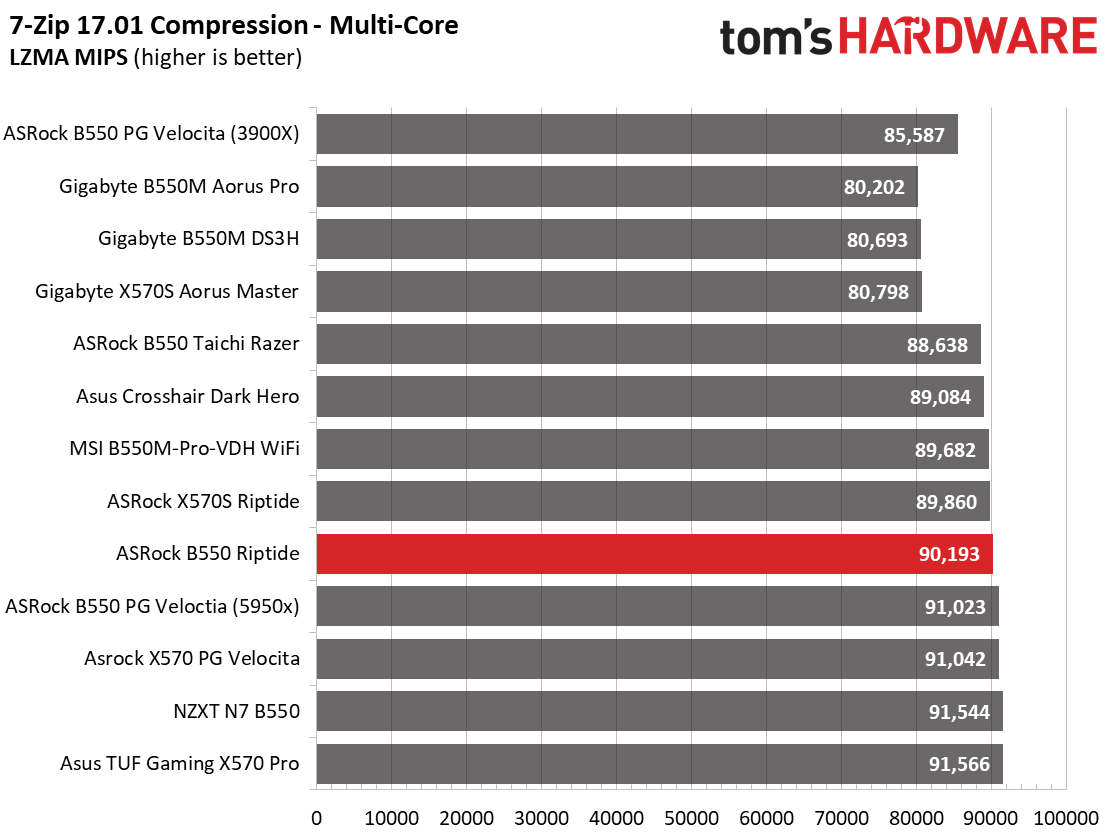
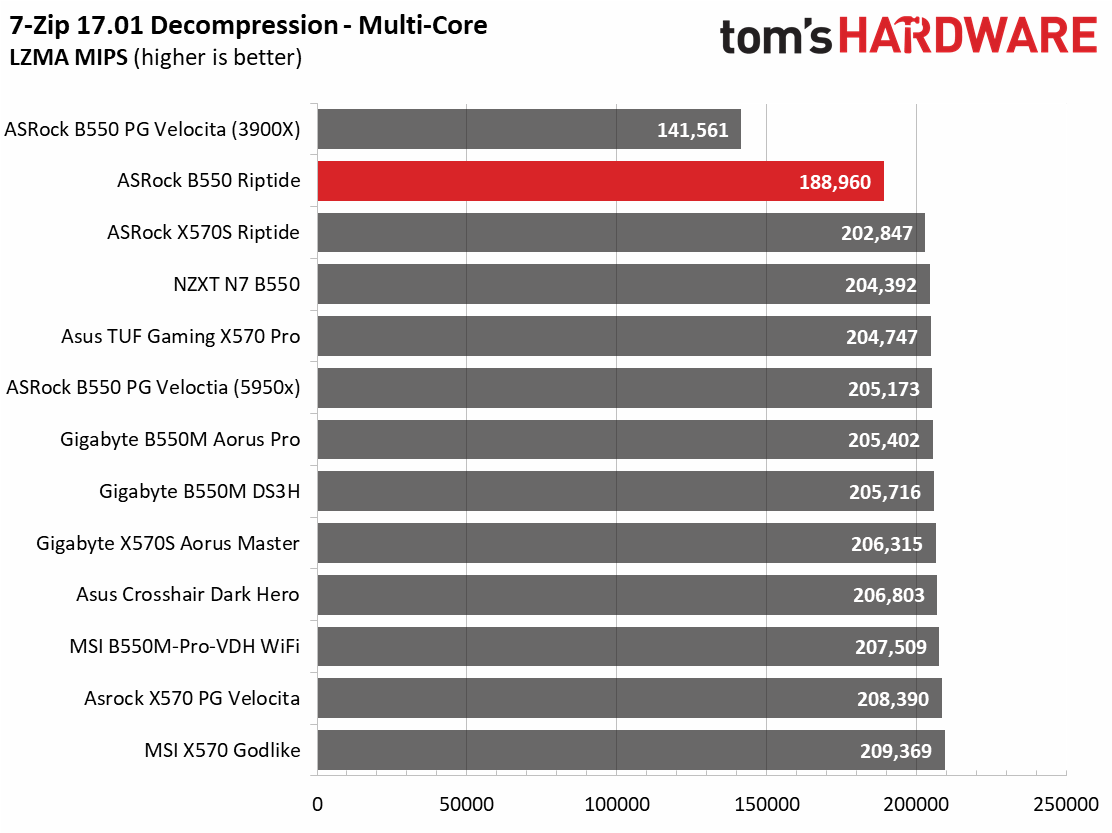
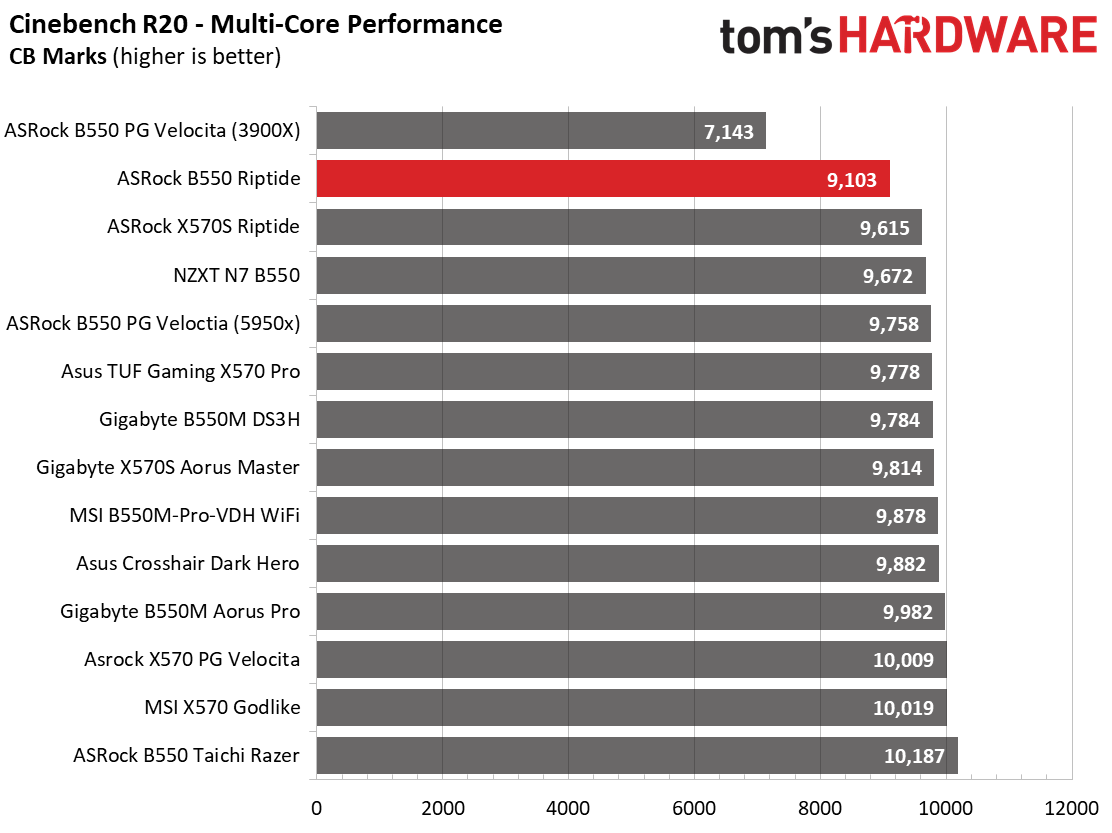
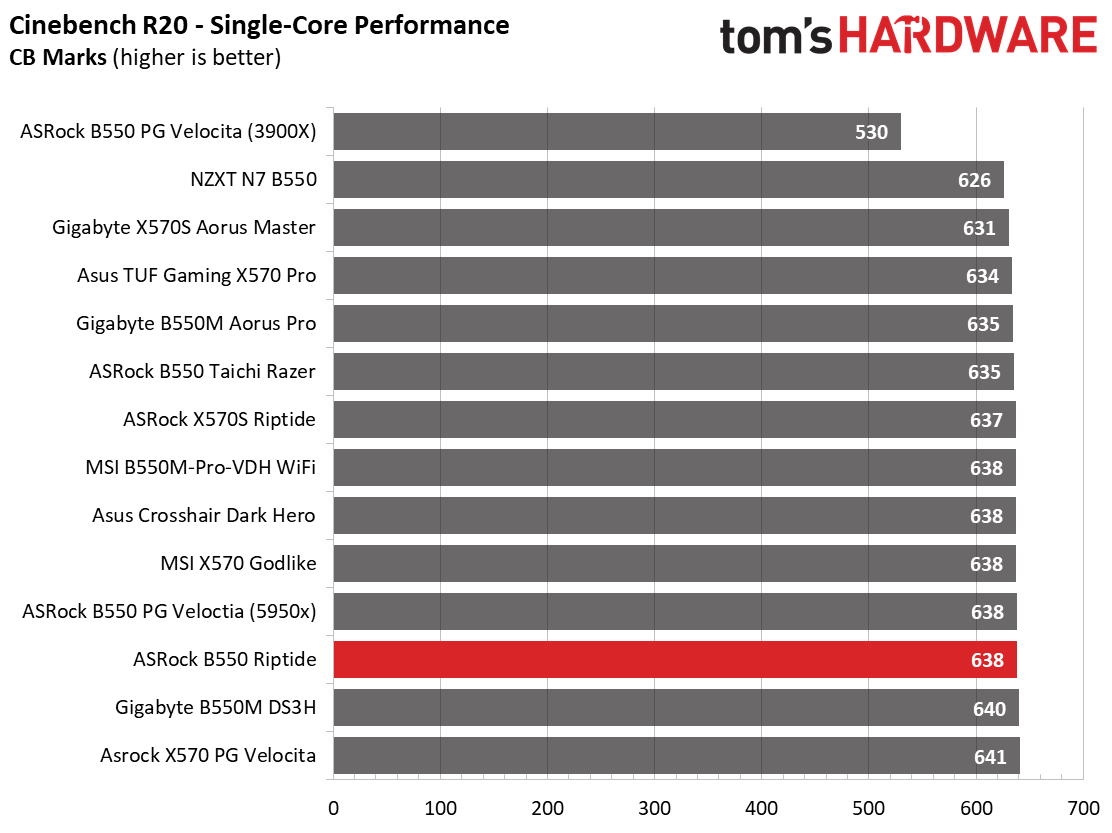
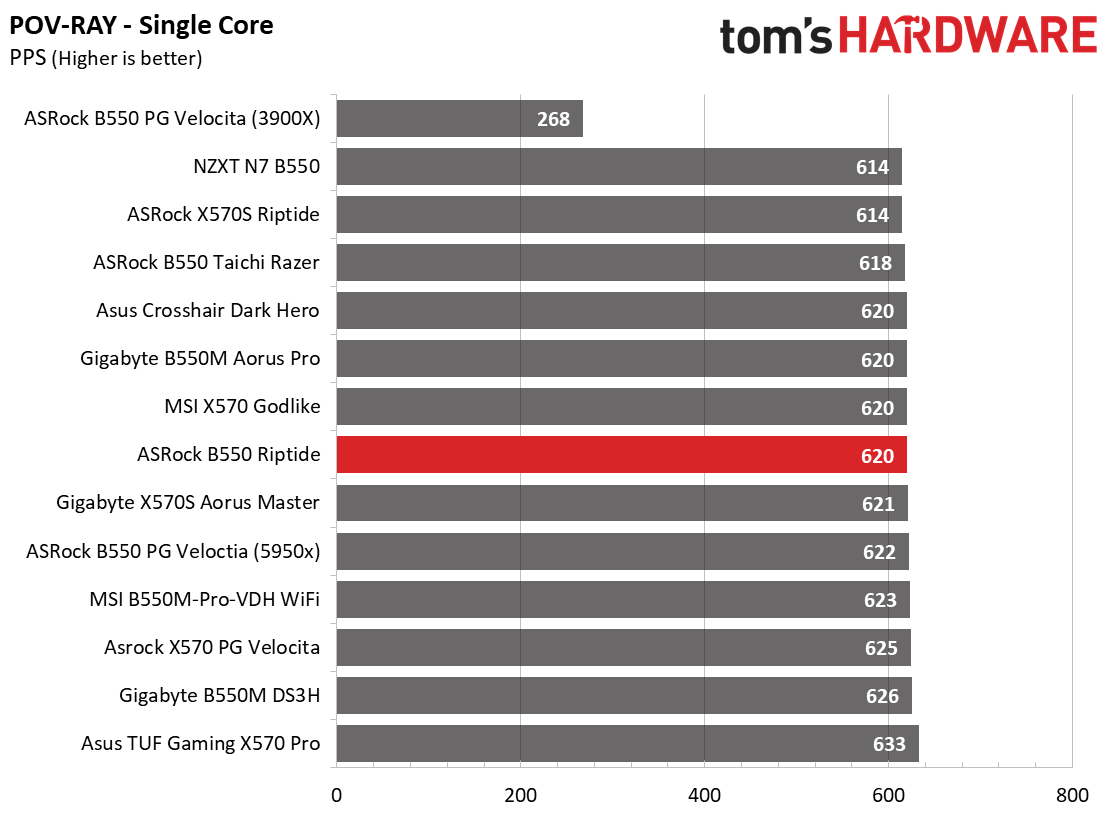
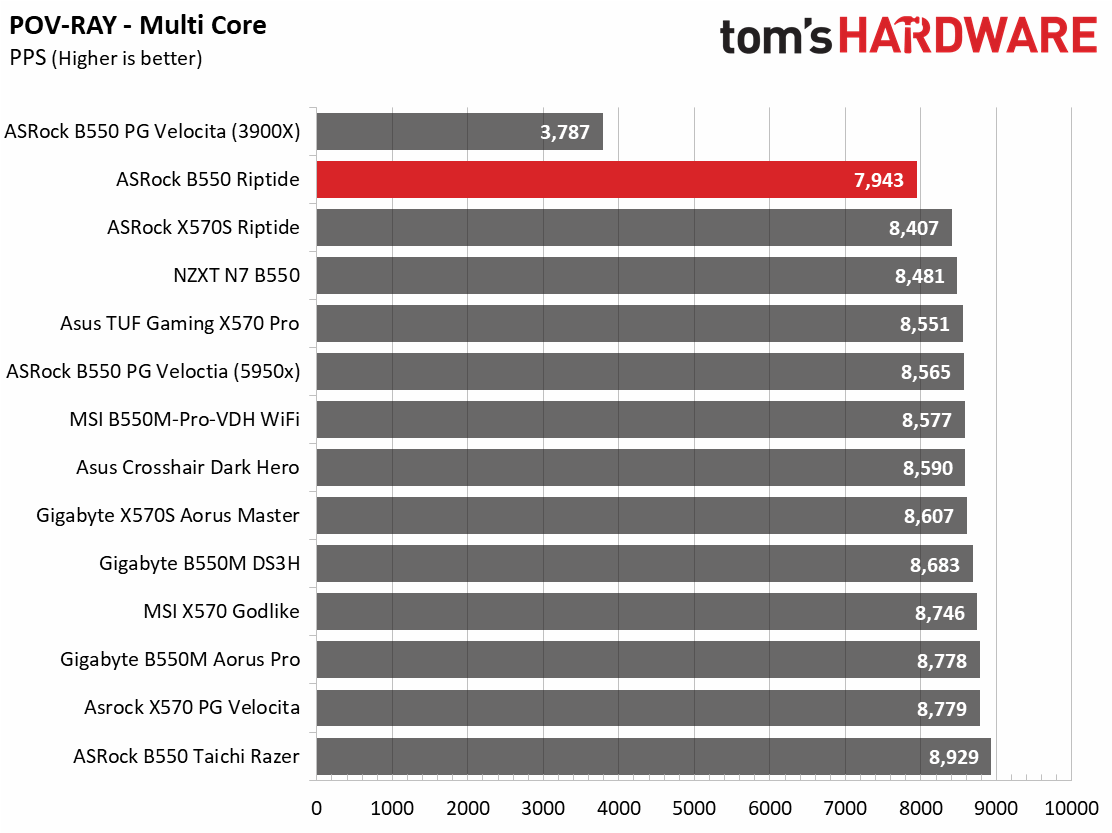
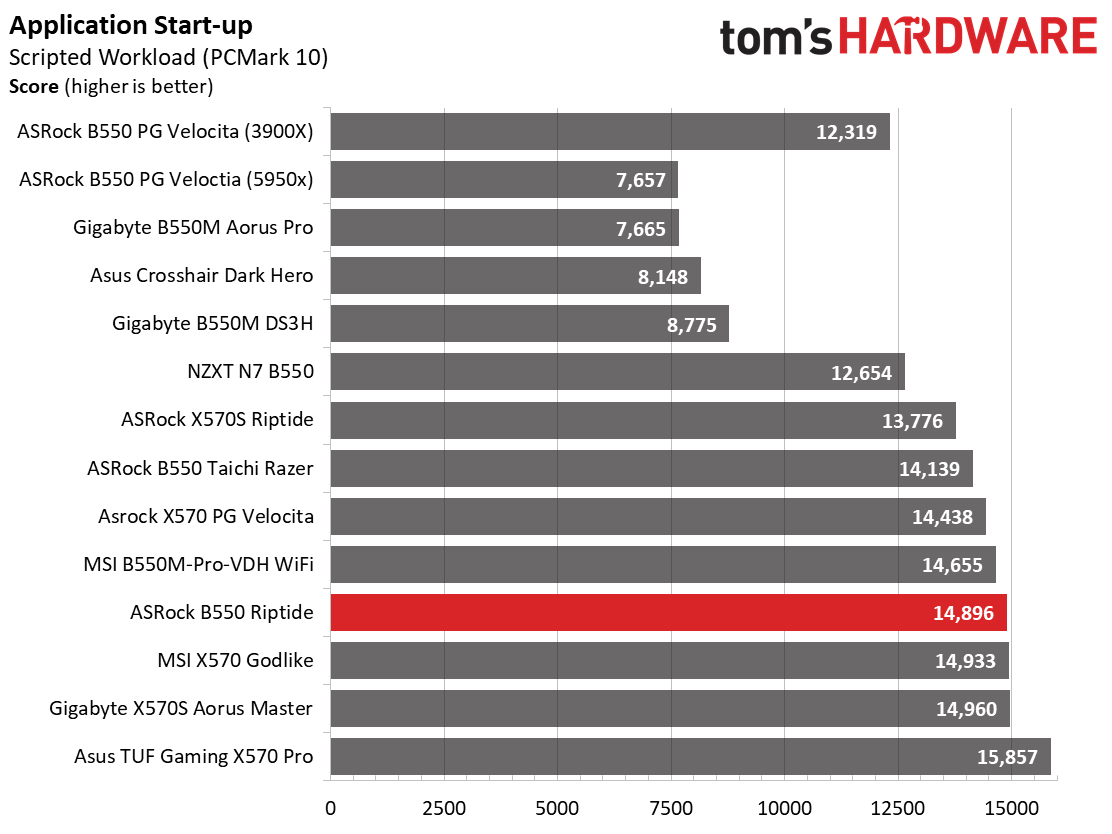
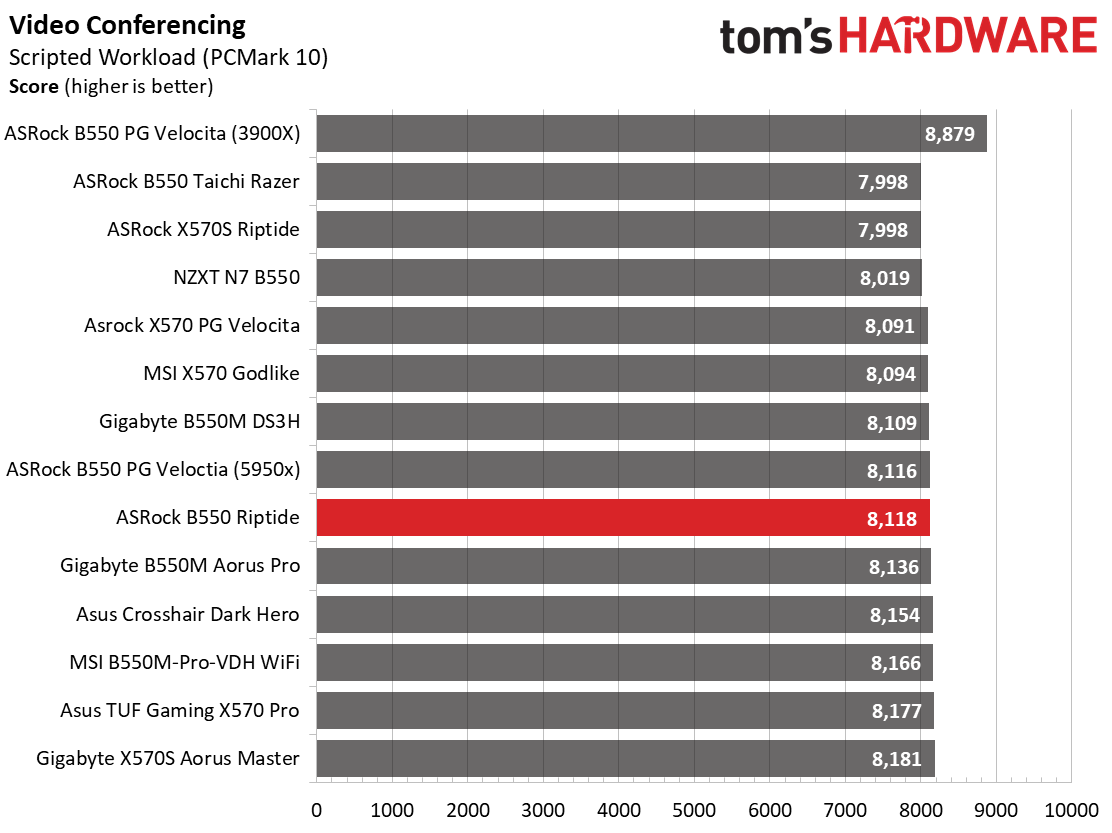
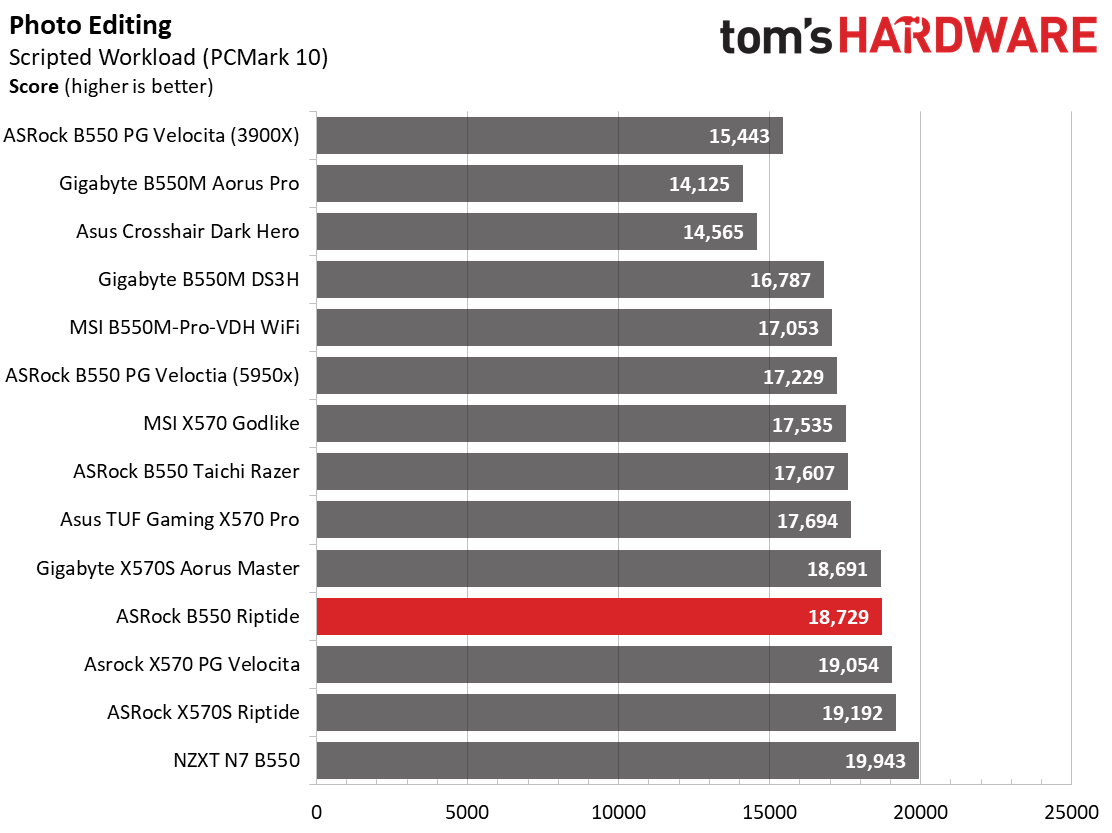
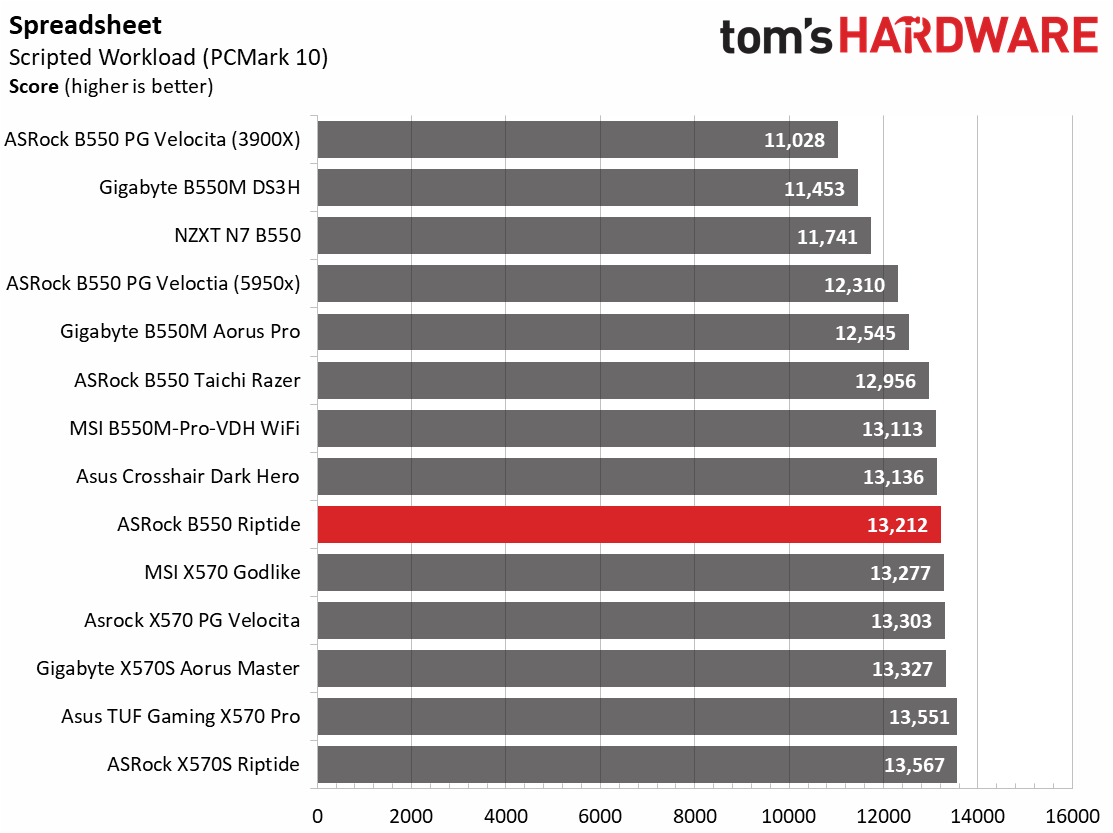
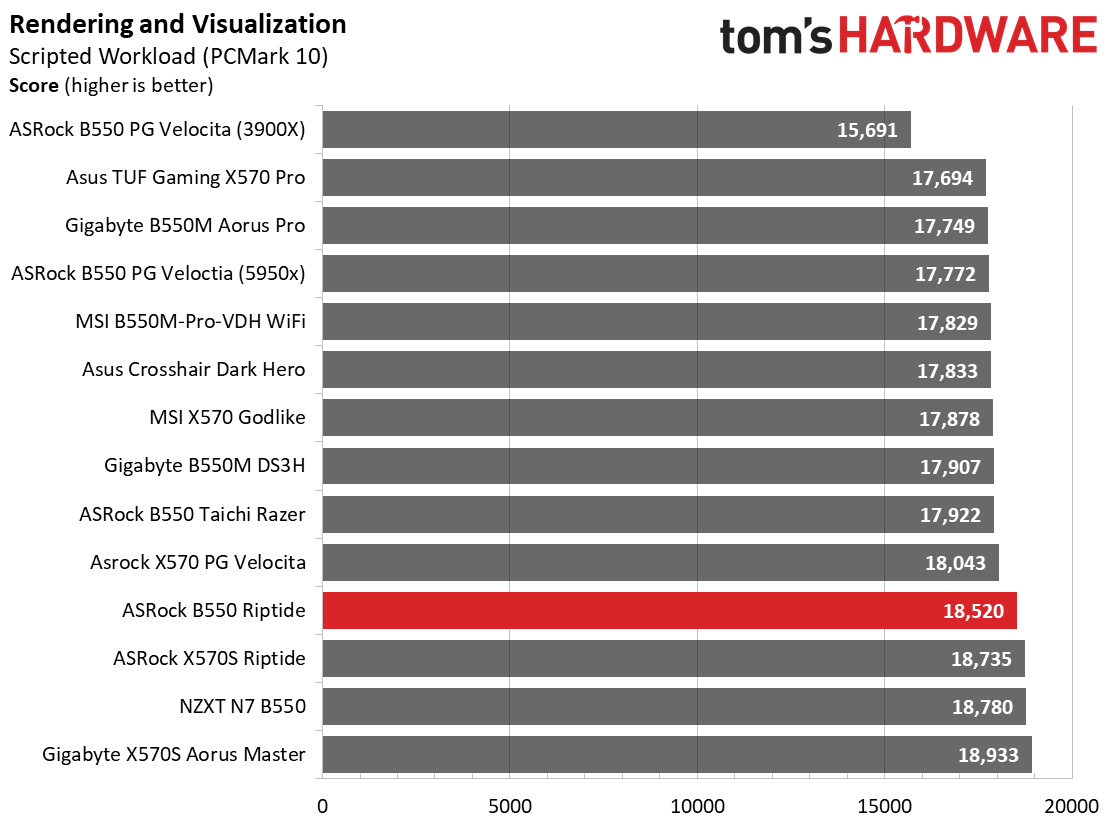
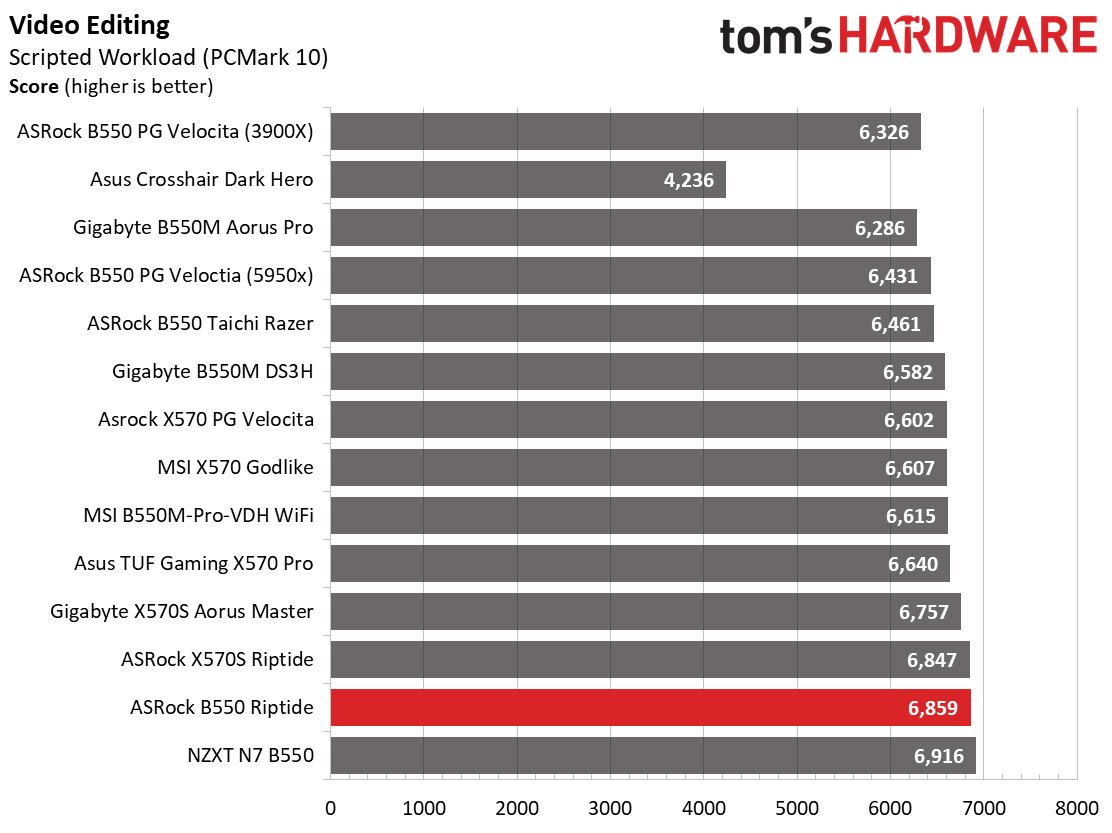
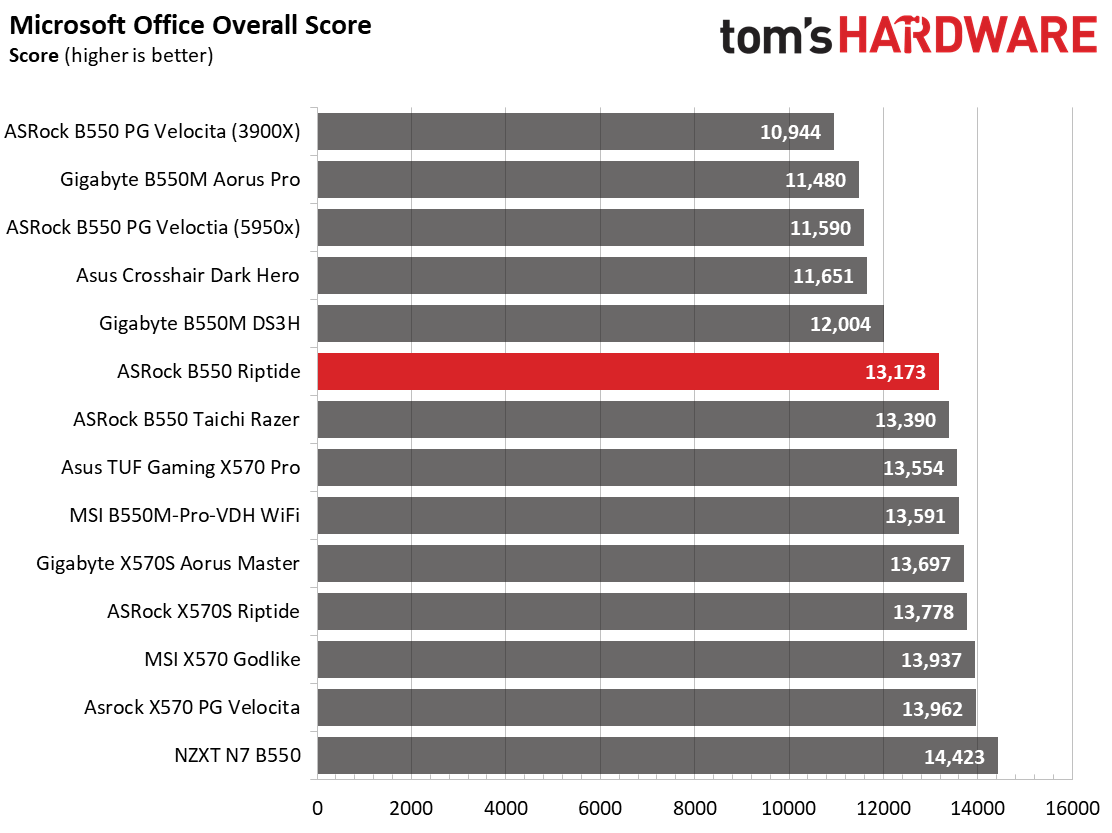
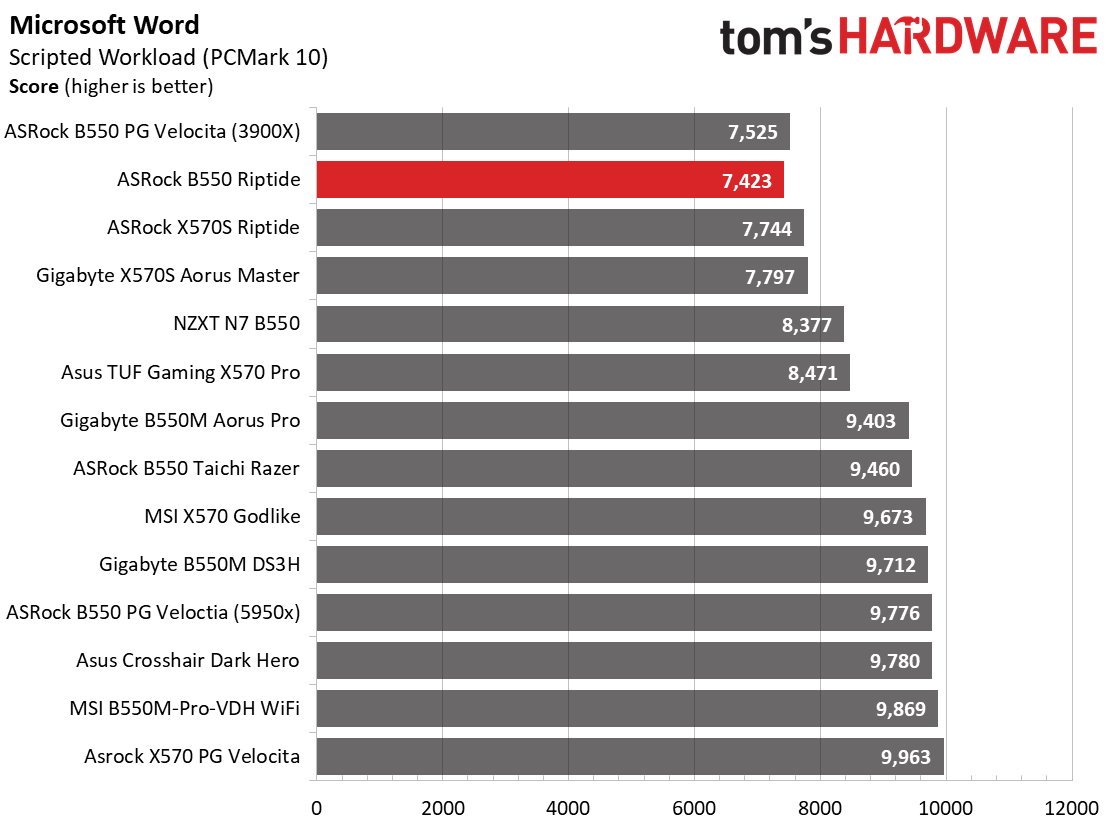
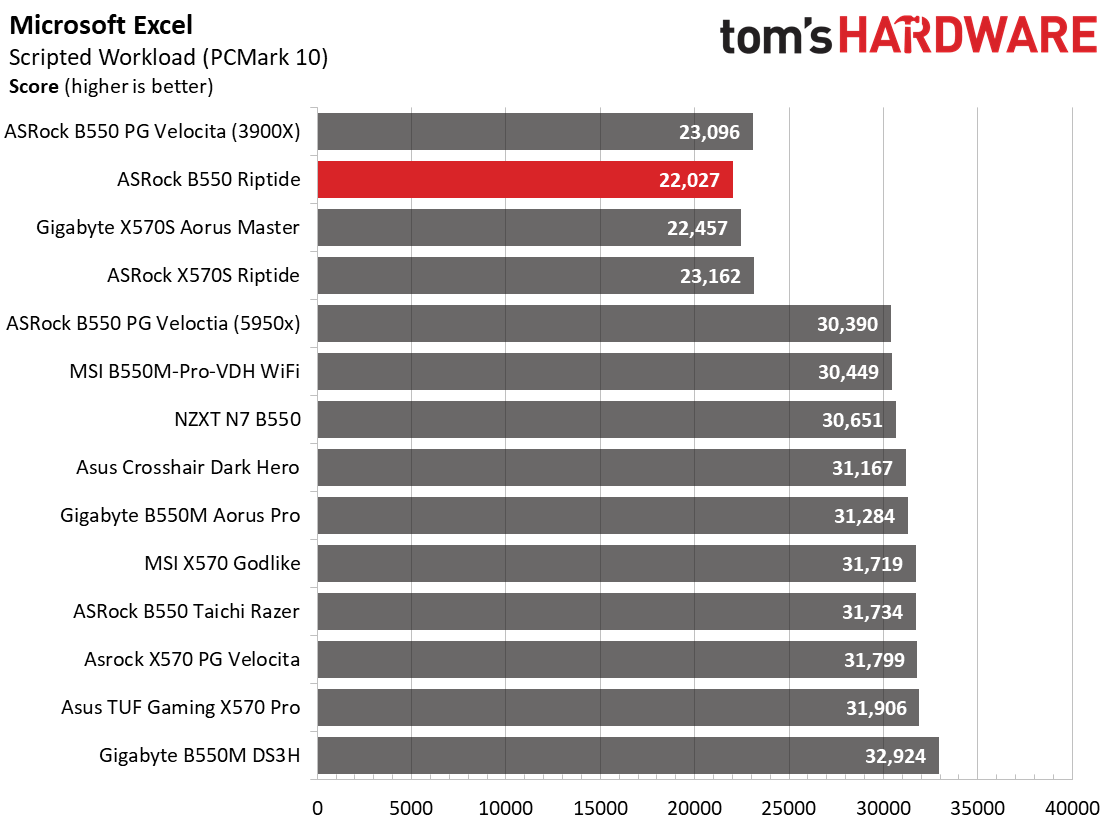
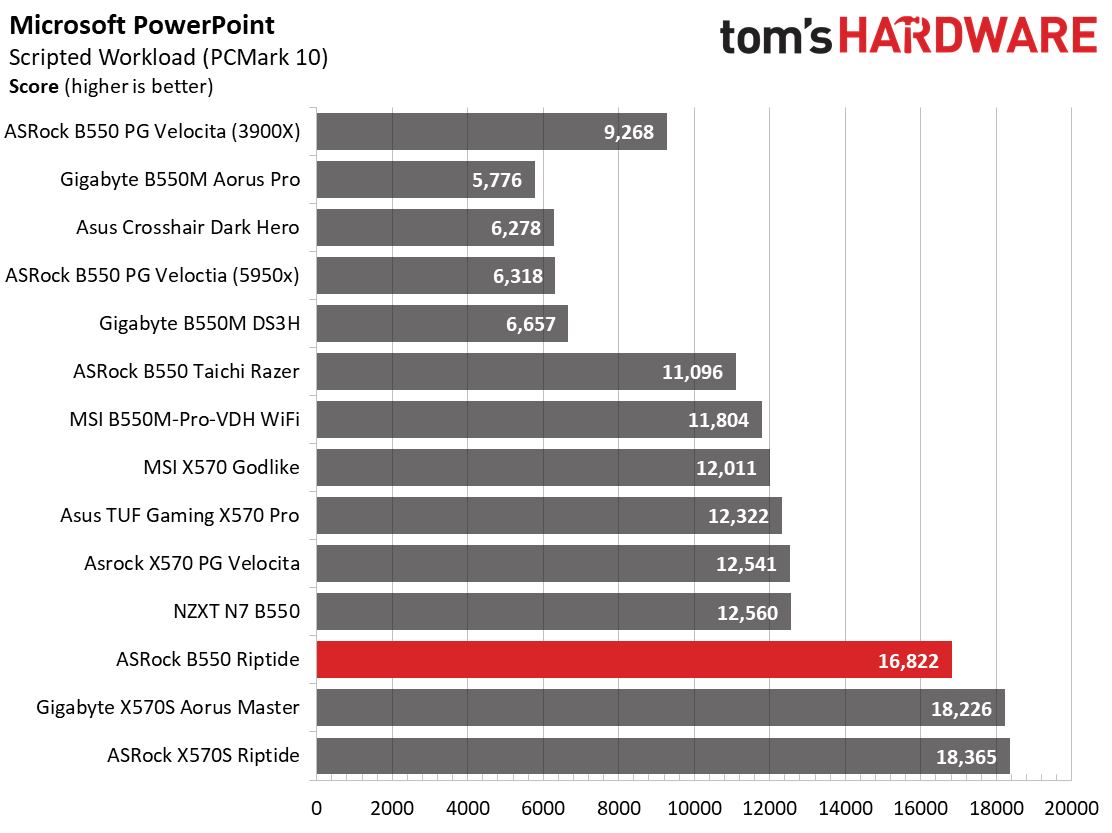
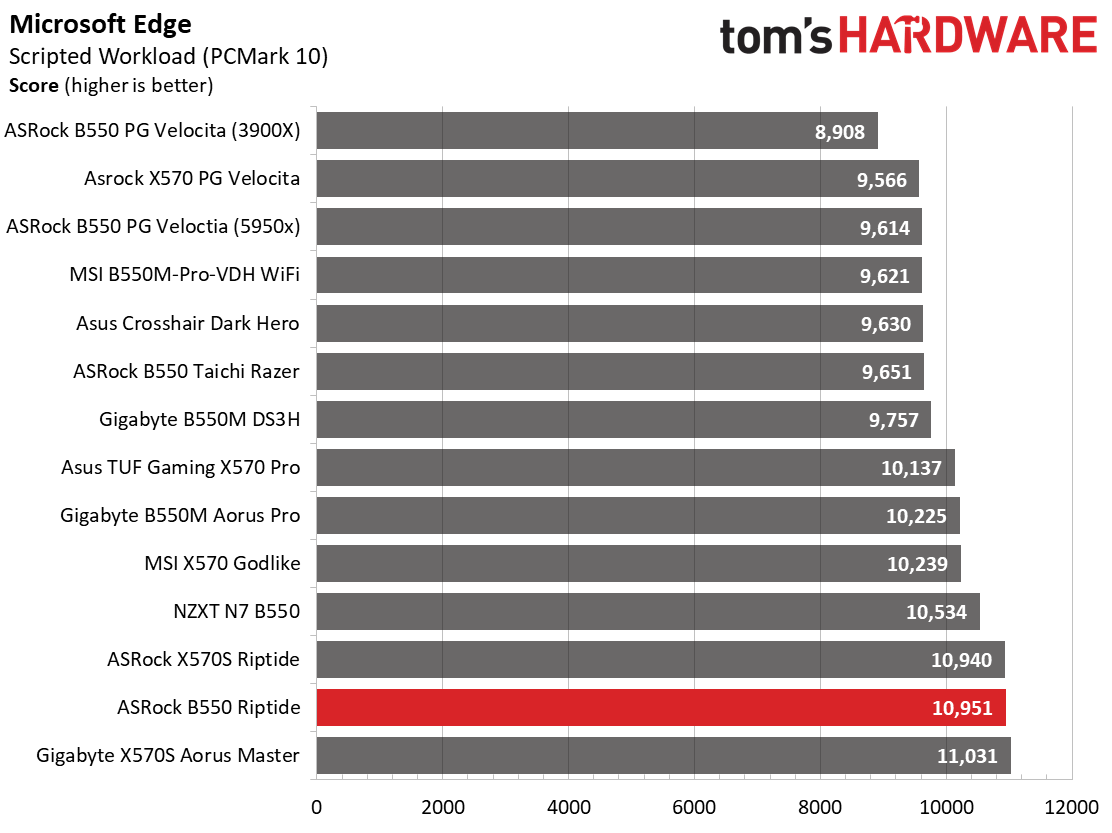
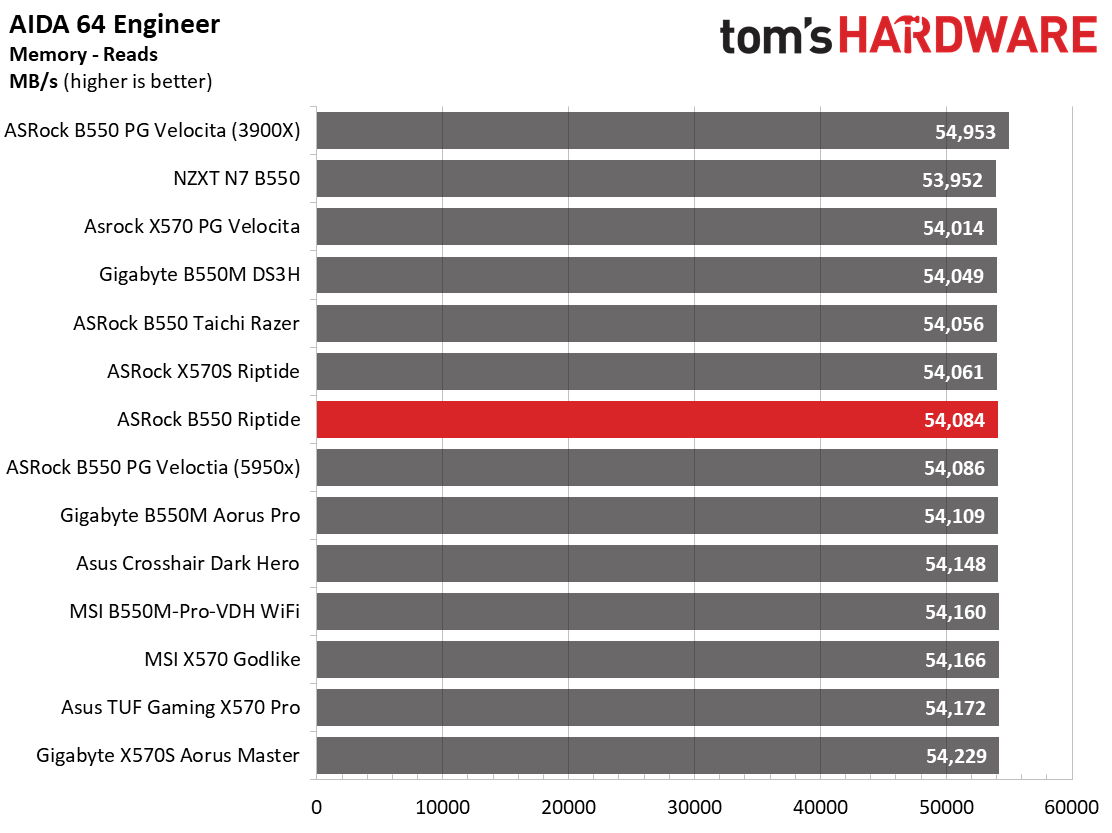
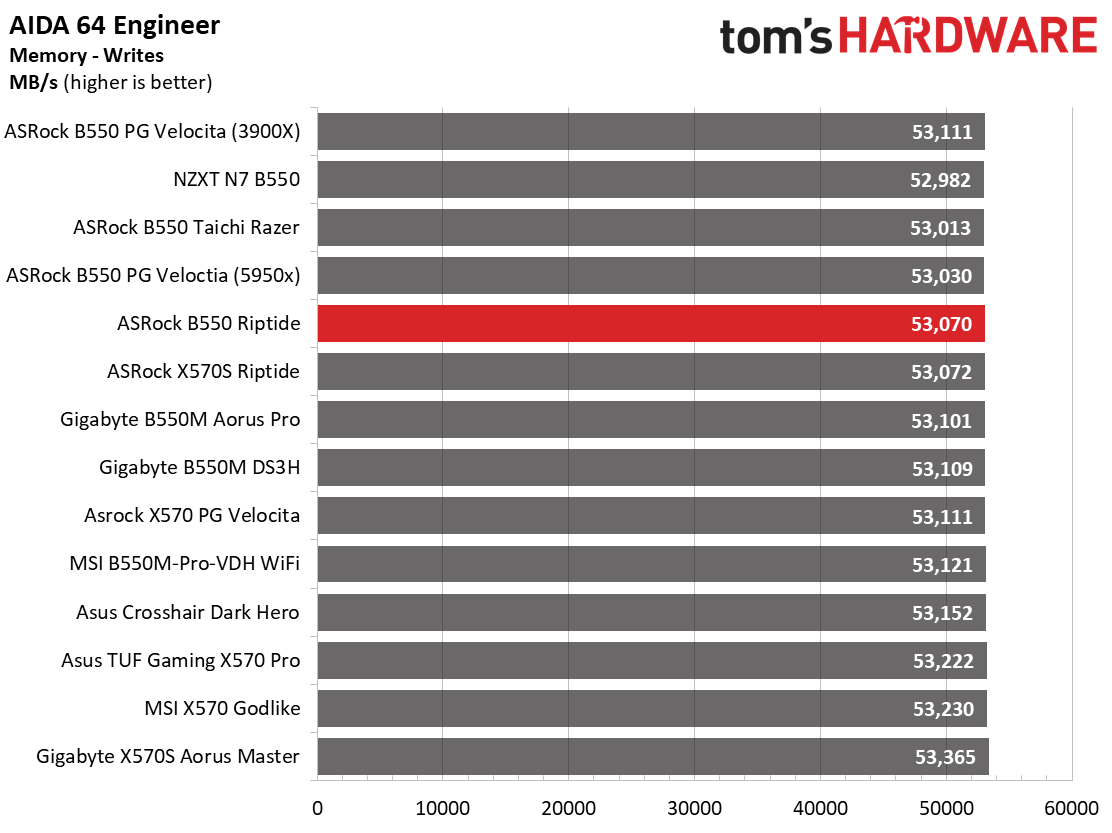
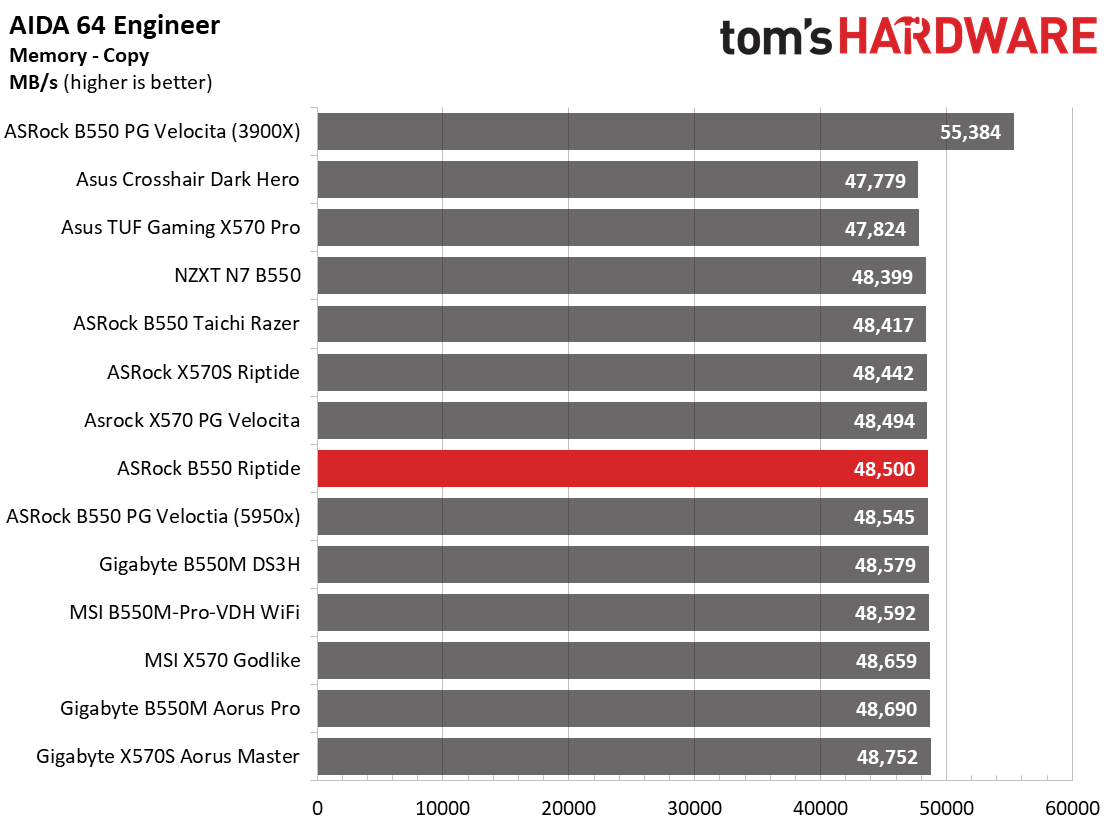
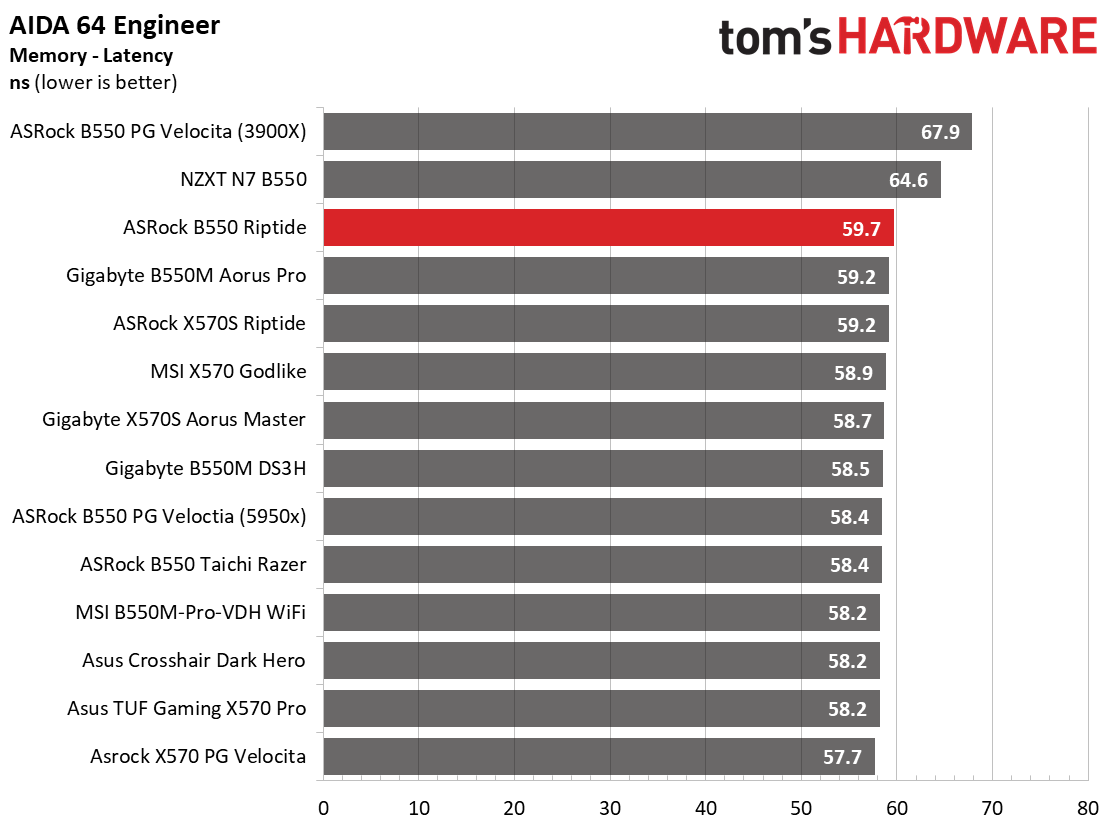
In our synthetic benchmarks, the B550 Riptide performed well in most of the single-threaded portions of the test. But when using all cores, the results were notably slower than average due to the board running the CPU clock speed slower than others during these tests. The PCMark 10 Suite testing resulted in average to above-average results. Memory bandwidth was also around the average for reads, writes, and copies, but latency was the second slowest here. In these tests, the system ended up just on the slower side of average.
Timed Applications
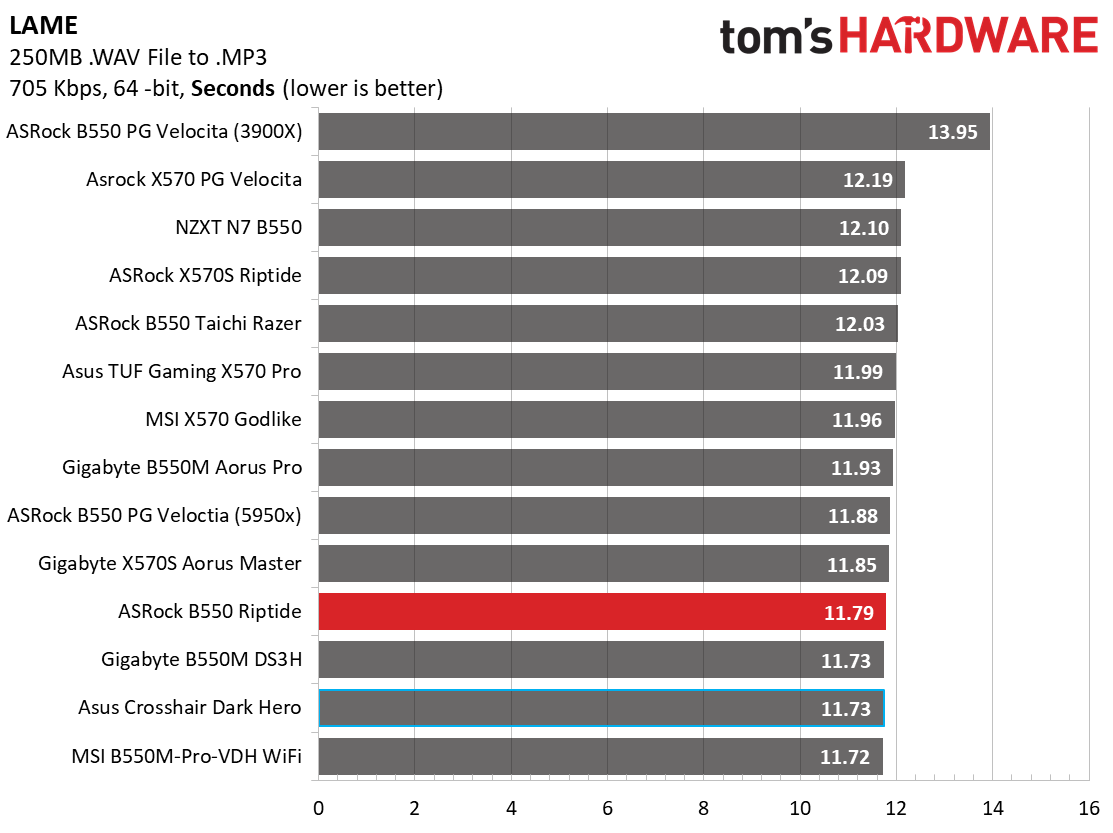
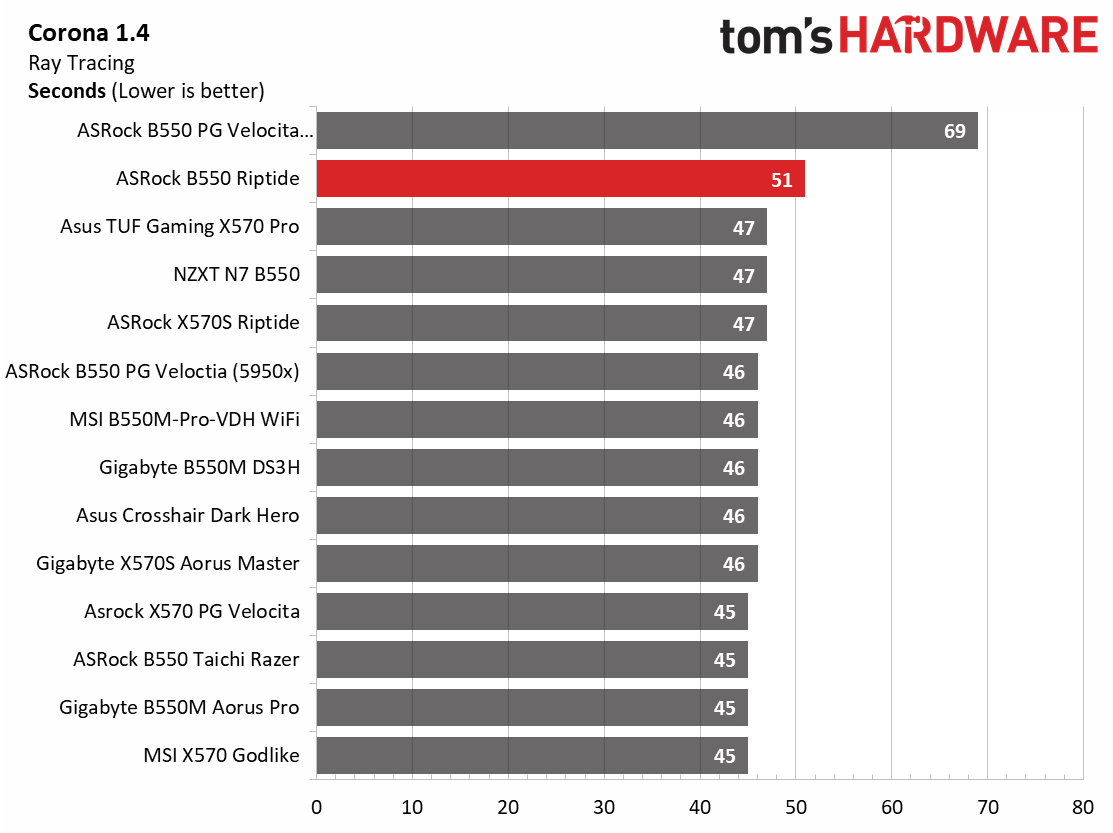
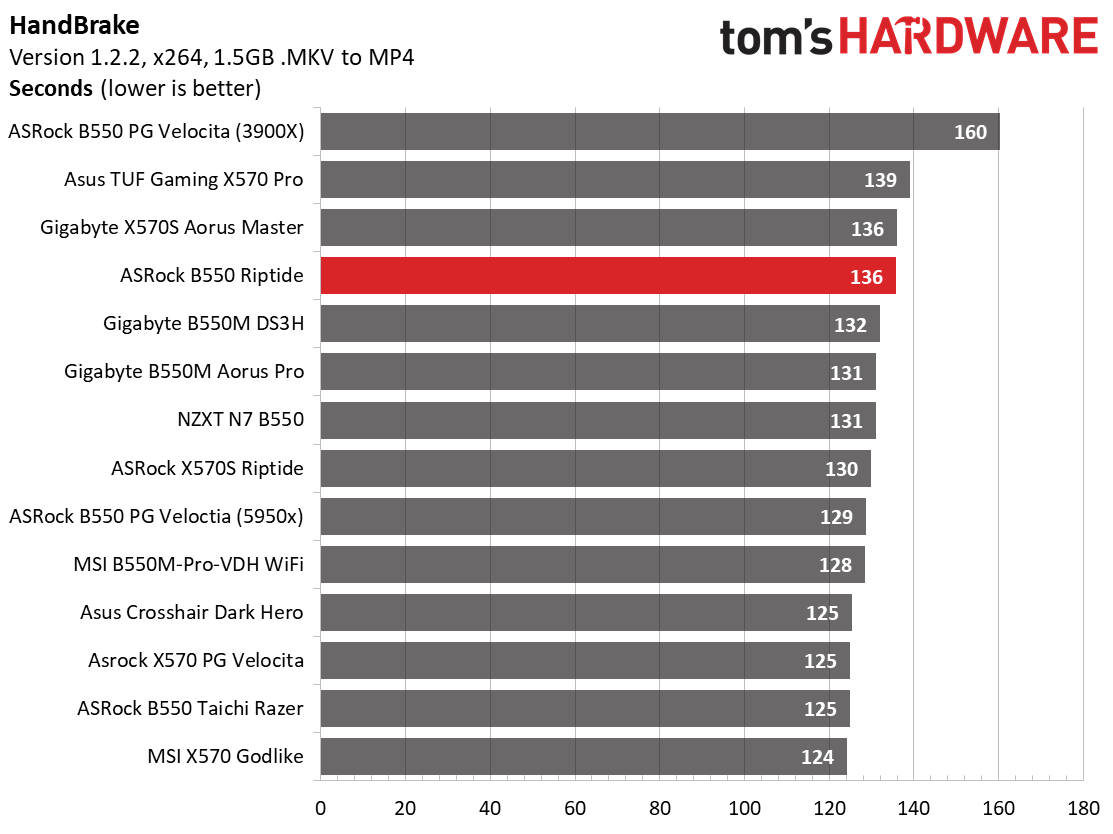
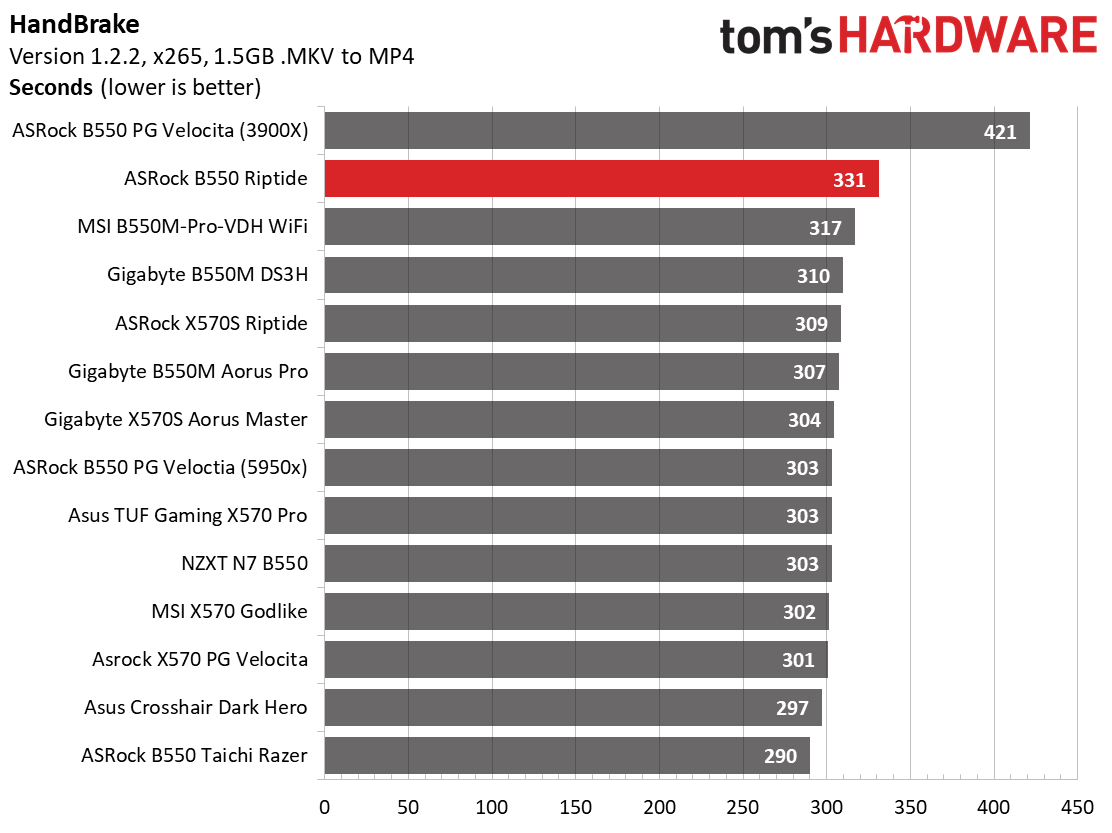
Again the Riptide ran this stressful all-core CPU benchmark slower than the other boards. In Handbrake, both tests were on the slower side of average at 136 seconds, while the x265 test was the slowest we’ve seen on this processor at 331 seconds (average here is 306 seconds). Corona testing was the slowest we’ve seen so far at 51 seconds (average here is 46 seconds). Here again, this board runs slower in these more stressful high-core use programs than most we’ve tested so far.
3D Games and 3DMark
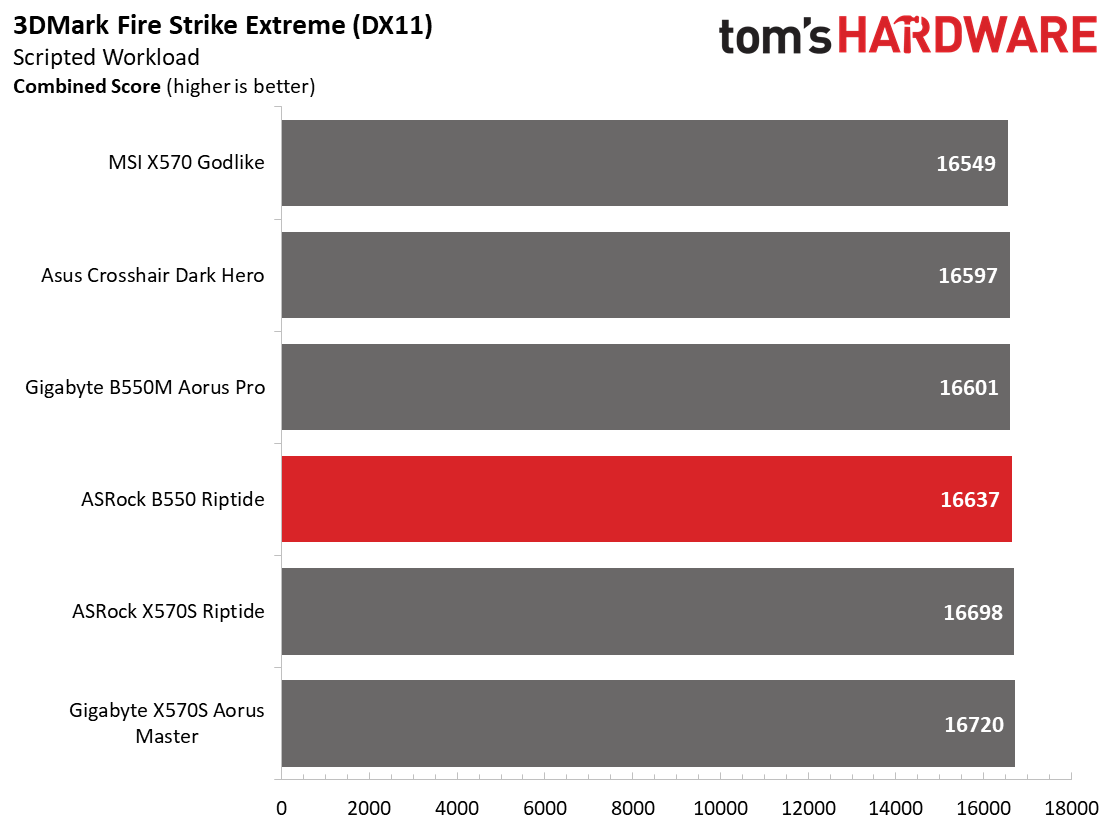
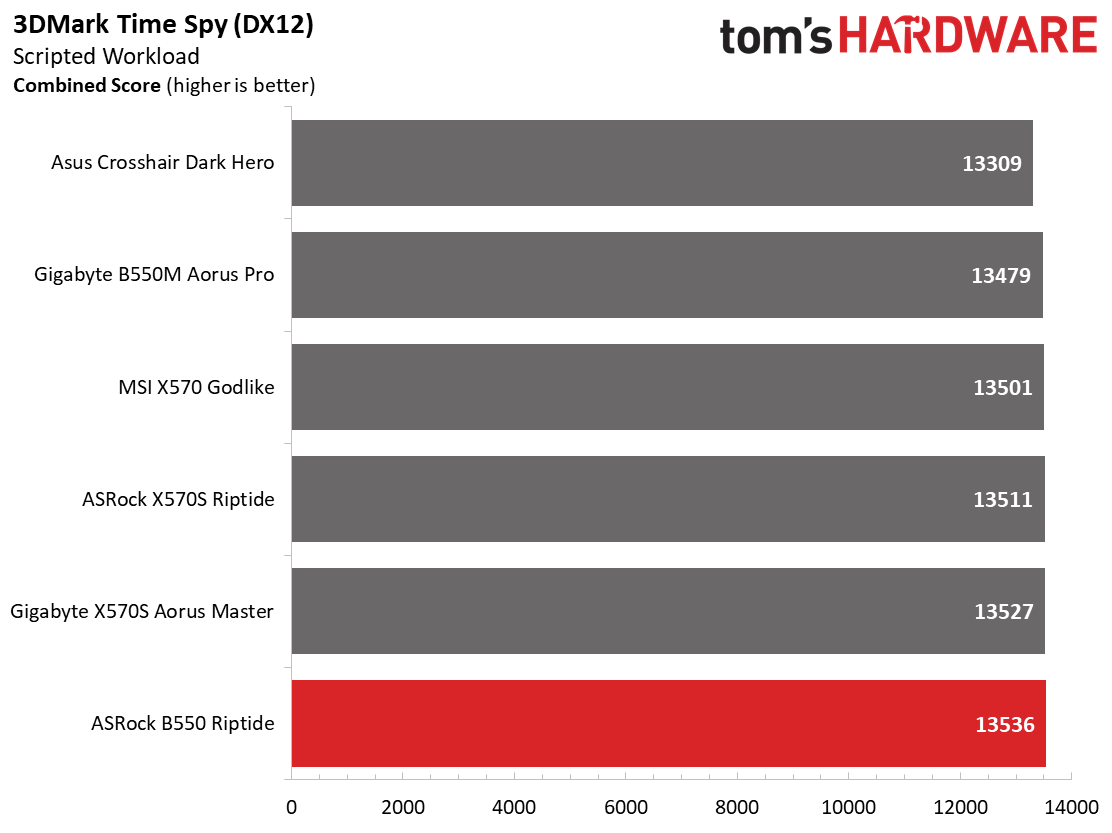
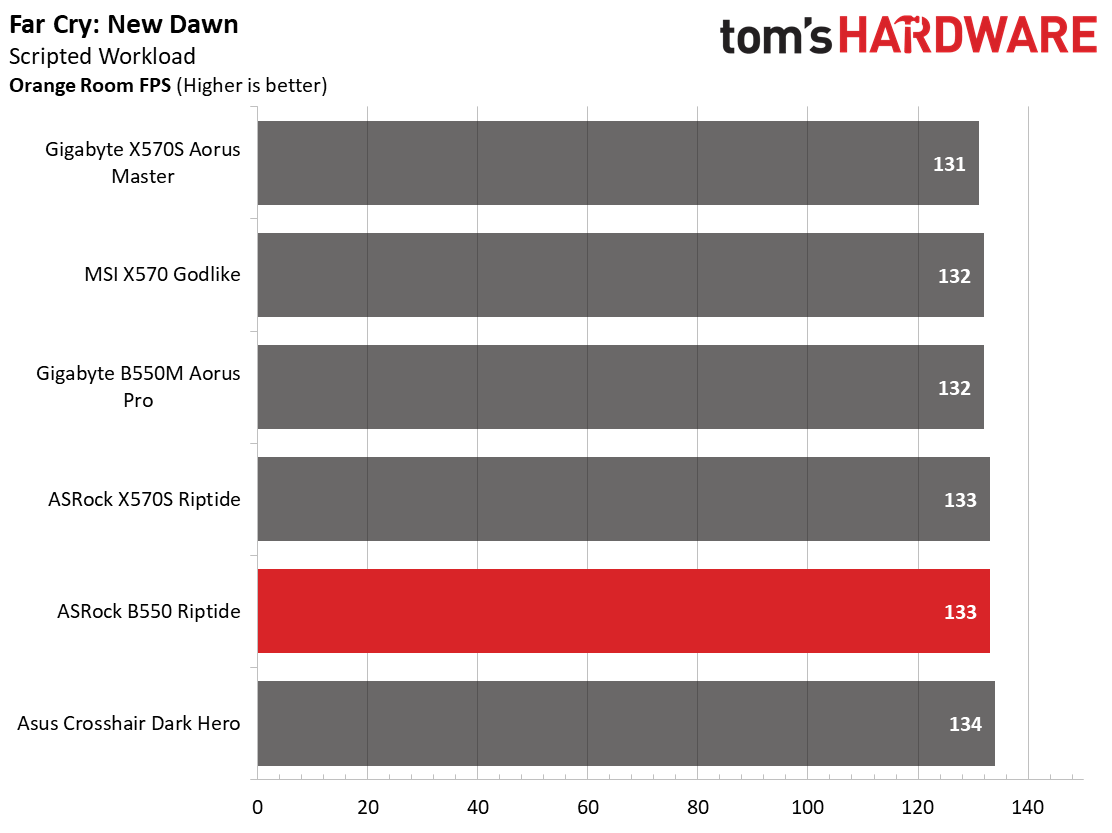
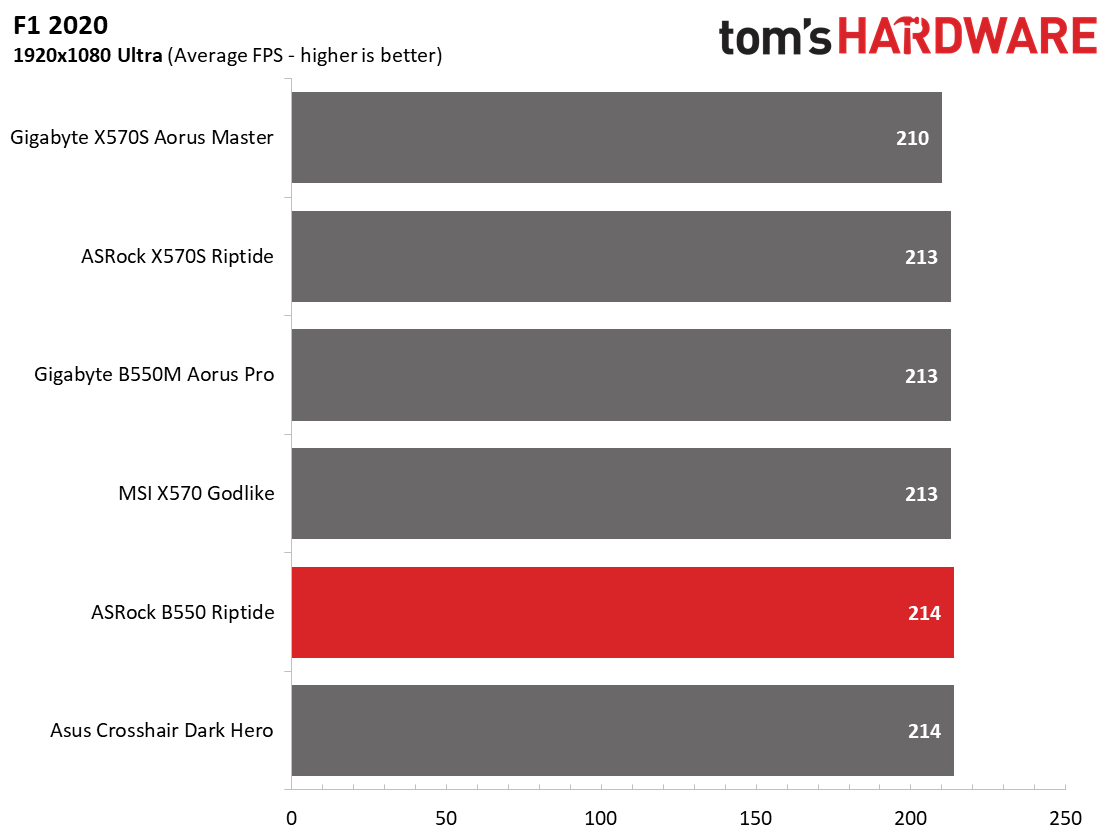
Starting with the X570S chipset, we’ve updated our game tests and hardware (video card) to match the Intel platform. We stopped using The Division 2 and Forza Horizon 4 and now use Far Cry: New Dawn and F1 2020, running on the Asus TUF Gaming RTX 3070. The games are run at 1920x1080 resolution using the Ultra preset. As the resolution goes up, the CPU tends to have less of an impact. The goal with these settings is to determine if there are differences in performance at the most commonly used resolution with settings most people use or at least strive for.
So far, the difference between boards in these tests is slight, with most falling within the margin of error differences.
When looking at the games, this system is capable of pushing the RTX 3070 without issue. In F1 2020, the B550 Riptide averaged 214 Frames Per Second (FPS) average (more than our Rocket Lake-based system, note), which ties the fastest result so far. In Far Cry, this board averaged 133 FPS, which is spot on average. It’s worth noting that, in Far Cry, the Intel-based machines run around 10-15 frames per second (a few percent) faster.
Get Tom's Hardware's best news and in-depth reviews, straight to your inbox.
Power Consumption / VRM Temperatures
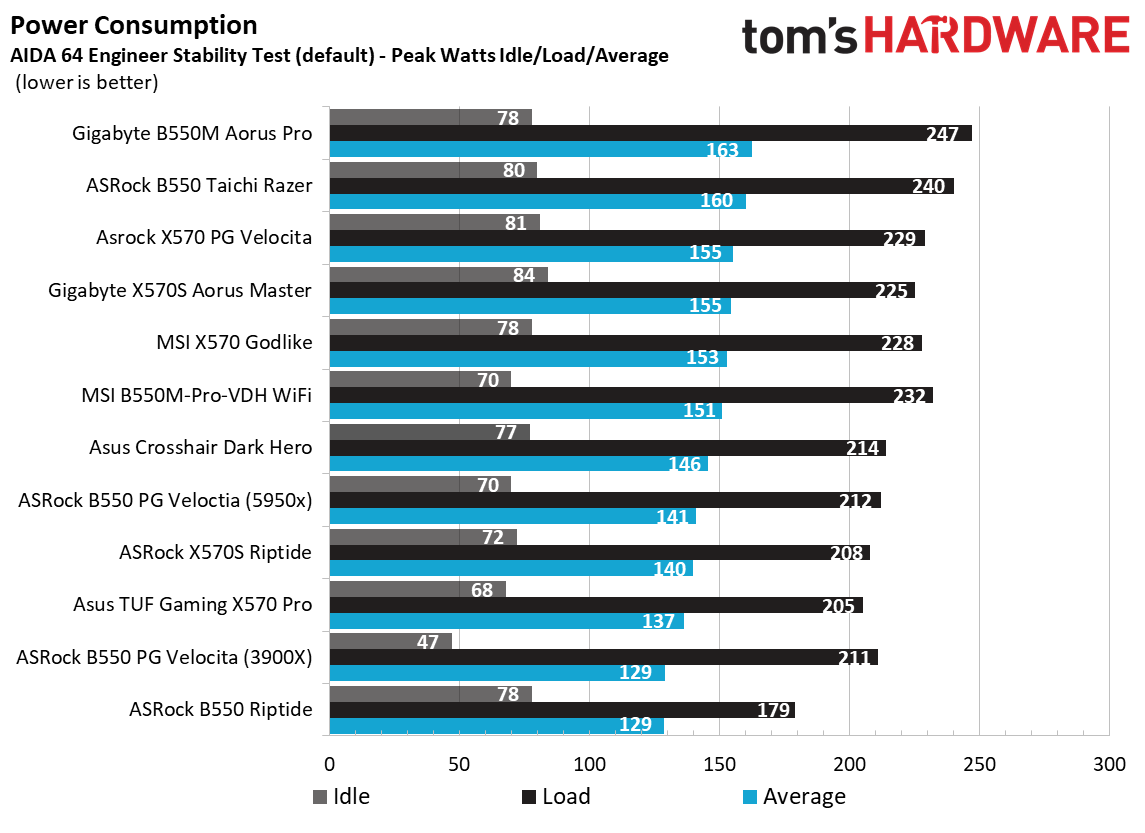
We used AIDA64’s System Stability Test with Stress CPU, FPU and Cache enabled for power testing, using the peak power consumption value. The wattage reading is from the wall via a Kill-A-Watt meter to capture the entire ecosystem. The only variable that changes is the motherboard; all other parts are the same.
At idle, the B550 Riptide used 78W, which is around the average of tested boards so far. Load wattage peaked at 179W, the lowest we’ve seen so far. This is due to the board running the CPU at lower clock speeds and voltages during this test. We saw the board fluctuate between 3.1 and 3.6 GHz, while other boards run faster (typically 3.6-4 GHz). This averages out to 129W and is the most efficient board we’ve tested, since it runs slower than most other boards during the stress test.
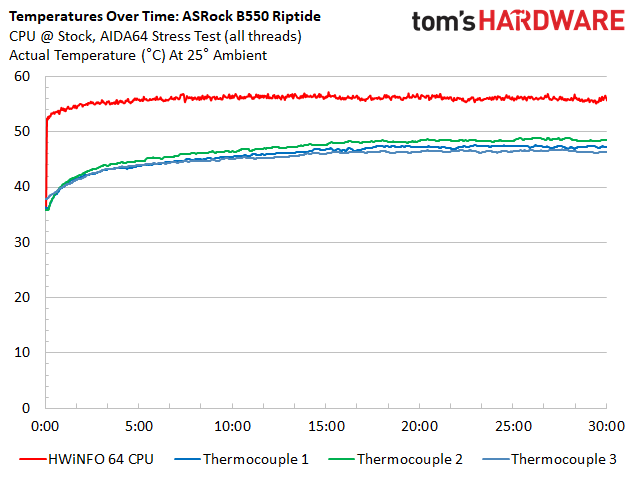
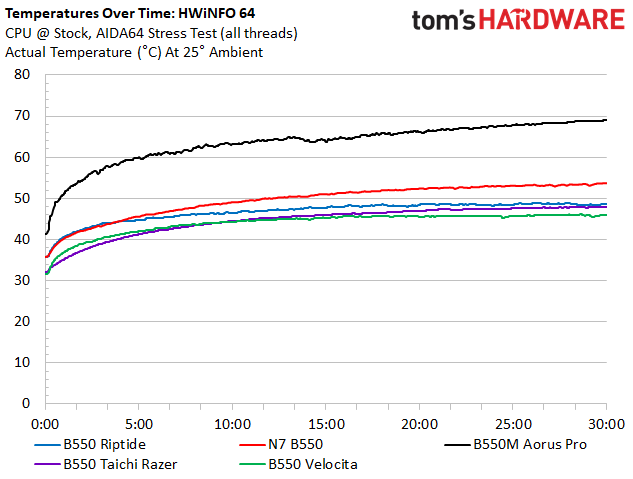
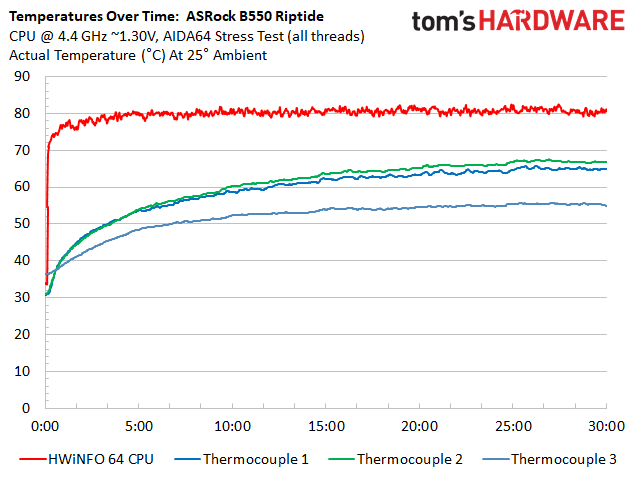
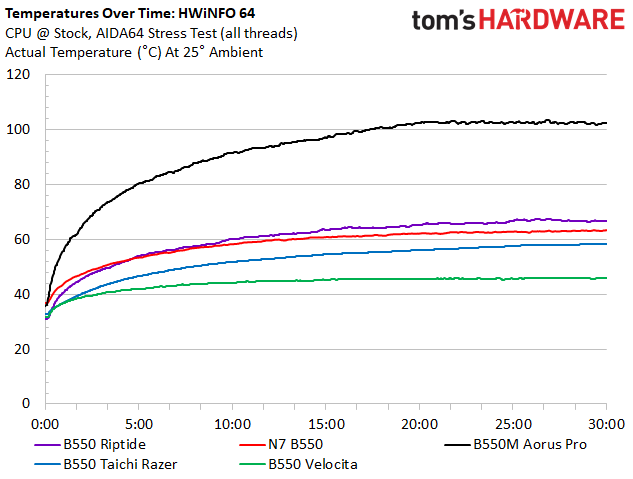
As far as the power delivery, the B550 Riptide’s 50A VRMs handled our Ryzen 5950X at stock without concern. Due to the OCP limit, we lowered the Vcore to 1.2V and the test ran without issue. I
The B550 Riptide peaked just under 50 degrees Celsius during stock operation, which is one of the coolest results we’ve seen on a passive heatsink configuration. This result isn’t because the VRM and VRM heatsink works well, but because of the lower voltage and clock speed during testing. When we overclocked to 4.4 GHz, we used 1.2V, causing a significant drop in power consumption and temperature. With that in mind, VRM temperatures peaked at nearly 70 degrees Celsius, one of the warmer temperatures so far. We need to remember that this is with 1.2V, so the results are not directly comparable. But since this is just about the end of the road before OCP kicks in, the temperatures are acceptable.
Overclocking
There are several ways to overclock on AMD platforms, depending on your goals. If your focus is single-threaded performance, you may want to focus on using Precision Boost Overdrive (PBO) and adjusting its parameters. If you can use all cores and threads, setting a manual CPU multiplier and voltage is likely the better route. While the latter clips peak single-threaded performance a bit, it increases all core/thread performance over the all-core boost. To that end, we settled on 4.4 GHz at ~1.3V for an all-core/thread overclock.
The B550 Riptide had some issues with our 16-core/32-thread Ryzen 9 5950X. As mentioned earlier, OCP protection kicked in when using 1.3V, so we ended up at 1.2V. Vdroop was significant but mitigated by adjusting LLC. Moving forward, I would like to see an option in the BIOS to raise the current limits so your overclock isn’t limited.
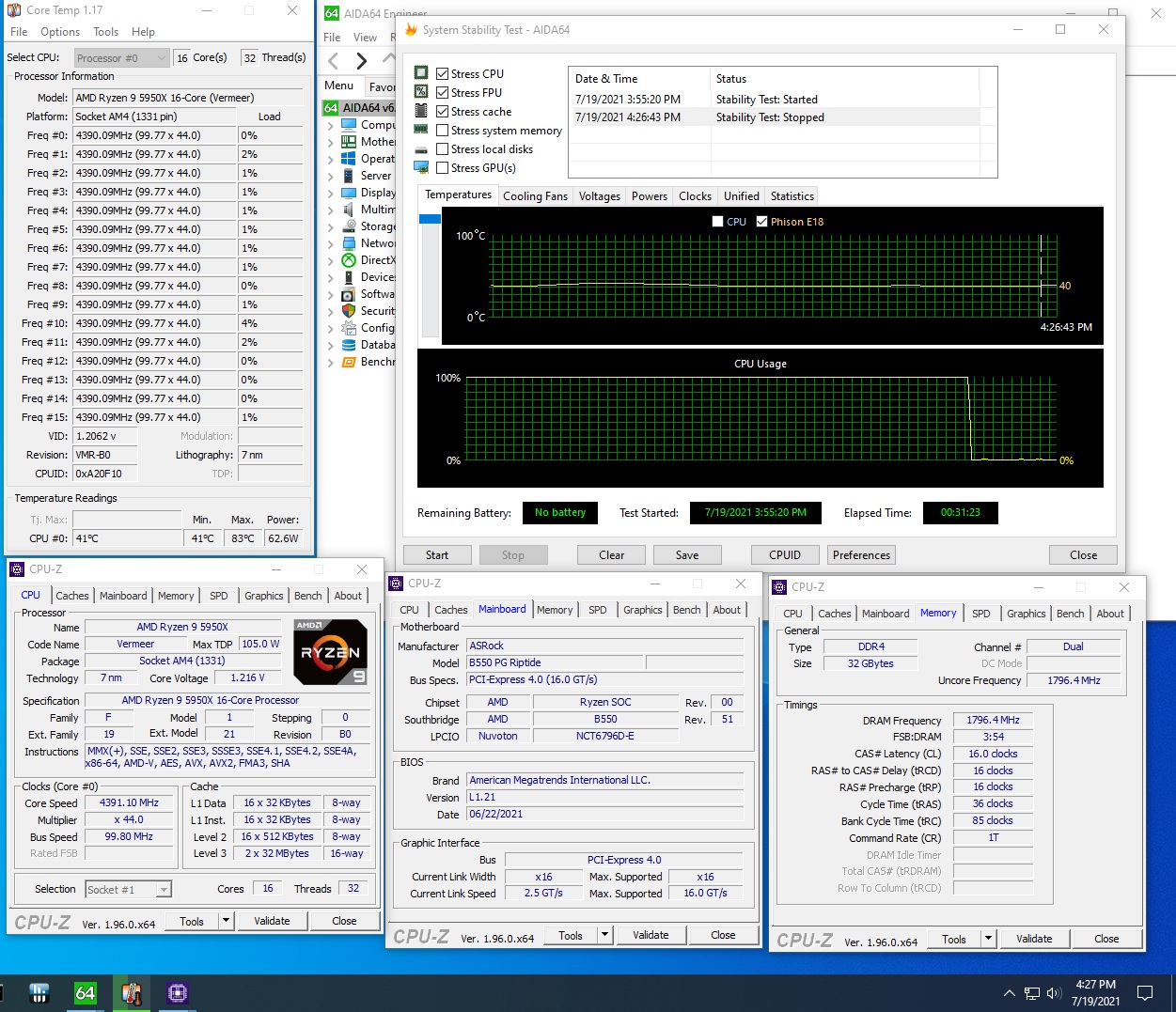
On the memory side, we know AMD is limited to around 3600/3733 MHz when keeping FCLK at a 1:1 ratio with the memory. With this in mind, we add two more sticks and run 4x8GB at DDR4 3600, which is AMD’s current sweet spot. For our B550 Riptide, we were able to set XMP, and it was stable enough to run through several of our benchmarks.
Final Thoughts
ASRock’s B550 PG Riptide hits retail at $159.99, positioning itself as a budget offering (in today’s world). The board includes capable power delivery, plenty of USB and SATA ports, two M.2 sockets, and a Killer E3100G 2.5 GbE. Overall, it is a well-rounded motherboard for the price and should fit the bill for most users. Performance during heavily multi-threaded applications (and stress testing) was slower than the other boards in several tests due to the lower clock speeds the board runs the CPU at. But remember we’re using AMD’s 5950X flagship chip--not a CPU most people would (or at least should) be using with a lower-end motherboard. During most other tests, including gaming and MS Office productivity, it performed right around the other boards.
The B550 Riptide’s low price does come with some sacrifices. First, the board doesn’t come with a USB 3.2 Gen2x2 port. So if you’re looking for ultra-fast USB connectivity, you’d have to use an add-in-card. If you need Wi-Fi, you’ll have to buy it and install it yourself. I’d also like to see a better audio codec, but do understand that this is one of the least-expensive ATX size B550 motherboards available.
There’s plenty of competition in this space, though. Gigabyte has its B550 Gaming X V2 ($149.99). Then there’s the Asus TUF Gaming B550M-Plus ($159.99), and the MSI MAG B550 Tomahawk ($159.99). All these boards sport two M.2 sockets and have capable power delivery. The difference between them outside of price comes down to several factors, including appearance, audio (MSI and Asus sport the better codec), and USB port count (none have 3.2 Gen2x2 - the Riptide has the most port by number). Other features including storage, (ASRock, Asus, and MSI have the most SATA ports), power delivery (all presumably capable at stock speeds), and networking are also critical.
If you’re looking for a B550-based motherboard for your AMD Ryzen based processor, ASRock’s B550 PG Riptide is a well-rounded option on the budget end. While there is competition at this price point, the Riptide offers a good value, especially if you’re using one of the lower-powered CPUs (say, 5800X or below) that runs unencumbered. In the end, the Riptide is a good inexpensive option to build your PC around, so long as you’re not pushing overclocks with the high-end processors.
MORE: Best Motherboards
MORE: How To Choose A Motherboard
MORE: All Motherboard Content

Joe Shields is a staff writer at Tom’s Hardware. He reviews motherboards and PC components.
-
HideOut Way to many compromises here. 2.5Gb ethernet is a good addition today, but 897 audio and no USB from this decade? FAIL.Reply